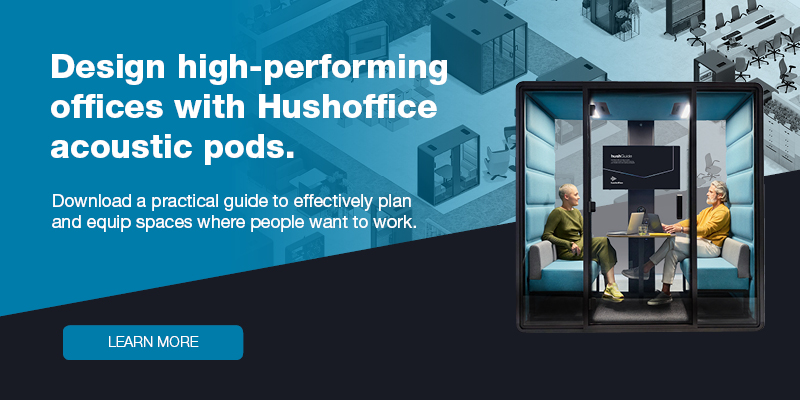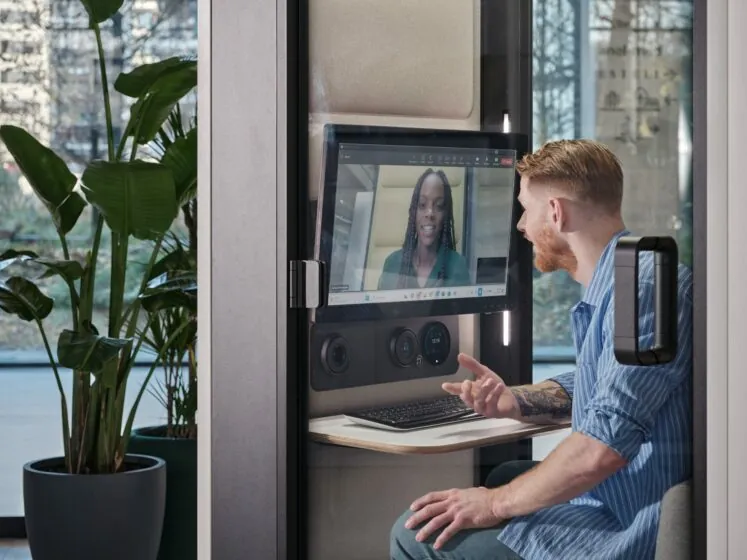Hushoffice booths solve the privacy problem of coworking spaces
- Posted on: 1 July 2025
- By: Hushoffice Team
Coworking environments are changing how and where we work. But as the trend grows, so do questions about privacy and information security. Quiet, private pods like Hushoffice are a sure solution.
How to maintain privacy in coworking spaces – tl;dr
- Coworking spaces offer energy and flexibility. But with that comes an undercurrent of risk. Unsecured devices, overheard conversations, and shared networks all make it surprisingly easy for sensitive information to slip through the cracks. Indeed, co-working spaces are the most likely place for data to be stolen.
- Protecting business privacy in these fluid environments takes more than just awareness. It requires a blend of employee education, encrypted tech, and smart workspace planning. Security must be kept in step with collaboration.
- Booths like Hushoffice have the power to transform any coworking space. They offer guaranteed speech privacy, sound isolation, and physical separation — all necessary for private calls, confidential meetings, or quiet focus work. Like on-demand sanctuaries, pods and booths giving teams a secure, comfortable space within an otherwise open layout.
Confidentiality in a coworking space isn’t typically breached by malicious intent. No, it can simply unravel through the everyday rhythms of open, communal work. The casual energy that makes these spaces vibrant, after all, also makes them porous. A sensitive comment shared over coffee. A strategic deck left open on a laptop. A call taken just a little too loudly. Such simple moments can all expose critical information without anyone noticing. This is why private, acoustically secure spaces like Hushoffice booths are essential for keeping what’s meant to be confidential, truly confidential
– says Mateusz Barczyk, Senior Brand Manager, Hushoffice.
One space, many teams. Coworking offices are on the rise.
By February 2025, U.S. coworking spaces had grown 25% year over year. Indeed, companies want flexible, cost-effective, and stimulating work environments, and shared offices can do it, blending creativity and community when properly designed.
What are the risks of sharing space with other industries?
In a coworking space, your next-door neighbor might be a legal consultant, a fintech startup, or a marketing agency. This professional diversity enriches the environment but also raises questions concerning confidentiality and competitive exposure.
Coworking thrives on openness.
But that very openness can expose businesses to silent threats unless everyone is proactive about safeguarding sensitive information. When multiple industries coexist under one roof, the risk of unintentional information leaks naturally increases.
Is coworking right for every industry?
While traditionally favored by creatives, freelancers, and tech startups, even professionals in finance, law, and consulting are finding ways to thrive in these spaces. Coworking can suit a surprising range of industries when the right precautions and setups are in place.
Protecting privacy in shared workspaces.
A team may not realize how exposed their conversations, devices, and digital footprints are until a leak has already happened. From shared infrastructure to unpredictable foot traffic, coworking offices absolutely demand a special vigilance — one where privacy is intentionally (and often spatially) built.
A constantly changing crowd means unknown risks.
Flexible offices are dynamic, with members frequently coming and going. This constant flux can make it hard to enforce standardized security practices across the board. And what works for one user might not apply to the next, leading to inconsistencies in how data and devices are handled.
Your information security is only as strong as the most careless user’s habits.
But with the right tools like secure logins, device locks, and awareness training, you can create a personal layer of protection that holds up, no matter who’s working beside you. For video-meeting over classified matters, private focus booths like hushFree.S.Hybrid are ideal.
Shared tech shares risk.
If improperly configured, shared devices can serve as entry points for unauthorized access or malware. Users may unknowingly save sensitive files or leave login sessions open. So secure infrastructure must be a baseline — not an afterthought.
No private workspaces, no privacy? Try Hushoffice pods.
One of the biggest challenges in coworking is the lack of enclosed, dedicated work areas. Without physical barriers, calls and video meetings are, of course, easily overheard. The solution to this serious problem is simple: private work and meeting booths such as the hushFree.M seating 4.
Where privacy breaks down: overlooked threats in shared work environments.
One can’t forget how many entry points exist for sensitive data to leak in a space designed for openness. And it’s not always about bad actors. Sometimes, say, a well-meaning neighbor borrowing the wrong printer or glancing at a screen too long will do it. That’s why building privacy into the everyday through secure digital practices and designated private spaces like acoustic booths — from a dedicated speech-secured call pod like hushFree.XS to a wheelchair-ready team booth like hushFree.Access.L — is absolutely crucial to a flexible office’s security
– says Mateusz Barczyk, Senior Brand Manager, Hushoffice.
A coworking environment’s confidentiality doesn’t usually collapse under a single, glaring failure. Rather, it collapses through a series of small, unnoticed gaps. One unmuted call, a file left open on a communal computer, or a weakly secured Wi-Fi connection, are typical culprits.
Unintentional information leaks during business conversations.
Without realizing it, teams may speak too freely or leave devices unattended, simply because their environment feels safe. But in reality, confidentiality always requires conscious effort. This is especially true in a casual setting where the line between personal and professional space can blur.
Insufficient network protection.
Without firewalls, encryption, and proper user isolation, open or loosely secured networks are easy targets for cyberattacks. Shared bandwidth also means shared vulnerabilities, making personal VPNs and dedicated secure routers critical.
Docks and documents left unattended.
Open seating can leave laptops, drives, and files exposed and easily accessible to others. And while most are trustworthy, all it takes is one bad actor for data to be compromised. Portable and secure storage solutions including document locking cabinets should be standard issue.
Keeping innovation yours: protecting ideas in shared spaces.
In spaces where the boundaries between teams blur, inspiration can drift into the hands of someone listening just a little too closely. Indeed, protecting intellectual momentum requires more than innovation but also intention, private pods, and the discipline to guard what sets you apart.
Use Class A acoustic booths like hushFree.S for confidential calls.
Soundproof booths offer an elegant and highly effective way to protect the privacy of any conversation in a busy coworking office. These enclosed spaces create a refuge where important discussions, whether strategic meetings, client calls, or sensitive HR conversations, can happen without the worry of being overheard. And with a 1-person pod like hushFree.S, you also enjoy ergonomic ease thanks to such a booth’s sit-to-stand work surface
– says Mateusz Barczyk, Senior Brand Manager, Hushoffice.
In a place designed for openness like most coworking hubs, booths are the quiet champions that safeguard your most confidential moments.
Secure all equipment and devices.
Co-working spaces are the most likely place for data to be stolen (compared to libraries, coffee shops, cafes, and airports). Biometric locks, strong passwords, and screen privacy filters can greatly reduce the chance of any hardware-based data breaches while portable cable locks will deter theft.
Encrypted connections and VPN.
VPNs are especially important in coworking spaces where networks are shared. As a matter of fact, organizations should encourage employees to use a VPN by default whenever working outside of a secured company network.
Document access management.
Even in casual coworking spaces, document hygiene is crucial. Cloud platforms that allow for document access control, version tracking, and remote deletion are ideal, and sharing should be limited to only those who truly need it, with permissions reviewed regularly.
Smart tech; safer teams. Tools to strengthen security in shared offices…
When paired with secure networks and privacy-first design, the right solutions create a stronger foundation for trust and data protection — even in the most open environments.
Encrypted locks and access restrictions…
A space with tiered access levels is inherently more secure. Modern coworking offices can implement smart locks on meeting rooms and lockers that require biometric or passcode entry. These reduce the risk of unauthorized access to both physical and digital assets.
Access monitoring software…
Software that tracks who accessed which room or device, and when, can be a valuable layer of accountability. It creates a traceable log of activity that’s useful for audits or internal reviews. These tools ultimately promote responsible behavior and help quickly identify anomalies.
Can you truly protect business secrets in coworking spaces?
Safeguarding business secrets in a coworking space requires solid awareness and habits. Thoughtful space planning must be combined with tailored security practices in order for every team to ensure that their sensitive conversations and data remain shielded without stifling collaboration.
Start by educating employees to protect their own privacy.
With ongoing training and awareness, your team can become the first line of defense in protecting sensitive information while still benefiting from the collaborative energy of their coworking office.
Of course, coworking spaces can be secure when every element of privacy is considered. And it’s not just about preventing blatant breaches. Privacy can be compromised in quiet moments, like overheard conversations or forgotten devices. The real challenge is balancing a culture of connection with the need for discretion, which requires well thought-out design and consistent vigilance. Acoustic pods like Hushoffice play a big role here, as they offer the dedicated sanctuary within the buzz where teams can meet freely, protecting their ideas without sacrificing the collaborative spirit that can make a coworking hub so valuable – says Mateusz Barczyk, Senior Brand Manager, Hushoffice.
How to maintain privacy in coworking spaces – tl;dr
- Coworking spaces offer energy and flexibility. But with that comes an undercurrent of risk. Unsecured devices, overheard conversations, and shared networks all make it surprisingly easy for sensitive information to slip through the cracks. Indeed, co-working spaces are the most likely place for data to be stolen.
- Protecting business privacy in these fluid environments takes more than just awareness. It requires a blend of employee education, encrypted tech, and smart workspace planning. Security must be kept in step with collaboration.
- Booths like Hushoffice have the power to transform any coworking space. They offer guaranteed speech privacy, sound isolation, and physical separation — all necessary for private calls, confidential meetings, or quiet focus work. Like on-demand sanctuaries, pods and booths giving teams a secure, comfortable space within an otherwise open layout.
Privacy in coworking spaces – frequently asked questions
How can companies maintain confidentiality in busy coworking spaces?
This requires clear data policies, use of VPNs and encryption, and holding sensitive meetings in soundproof booths like Hushoffice. Educating employees about risks and encouraging good habits is also crucial. This may include habits like locking computers or avoiding confidential talks in open areas.
What are common security risks in coworking spaces? How can they be addressed?
Shared networks, open seating, and communal devices can all expose data. Using VPNs, strong passwords, privacy screens, and acoustic booths reduces these risks. Operators can also enhance safety with access controls and monitoring systems.
Why are acoustic booths and pods important for privacy in coworking offices?
Pods and booths like Hushoffice minimize sound leakage. They create a private space for confidential conversations away from the noise of shared areas. This protects sensitive discussions and encourages awareness of confidentiality. They are essential for maintaining privacy in any coworking environment.










